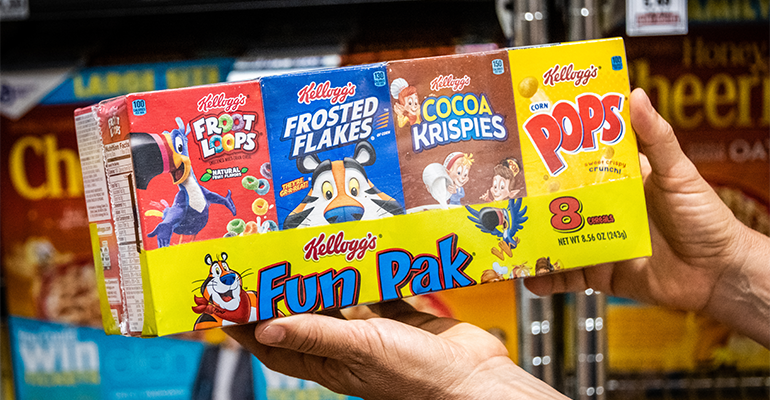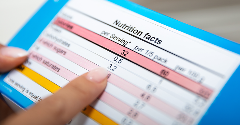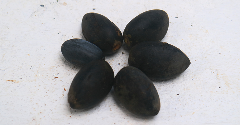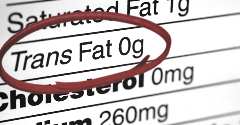Kellogg’s loses UK legal case against high-sugar cereal rules
11 Jul 2022US cereal manufacturer Kellogg has lost a UK High Court case that challenged regulations intended to restrict the promotion of high-sugar breakfast cereals in supermarkets.
The case revolves around UK plans to introduce regulations limiting the promotion of foods that are “high in fat, salt and sugar” (HFSS) in supermarkets and other large retailers, as part of its efforts to curb obesity.

Kellogg’s claimed new regulations, which will restrict promotional offers and the prominent placement of high-sugar cereals that are classified as ‘less healthy’, was unfair.
As well as restrictions on offers, such as buy-one-get-one-free and TV advertising, the regulations also ban online or app promotions, including putting HFSS foods on website homepages or displaying them when consumers are looking for other items.
Should milk count towards the nutrient profile?
A major argument brought forward by Kellogg’s in the case was that the nutritional content of breakfast cereals should be assessed with milk, and not on a dry weight basis, with the multinational arguing that the UK government had failed to consider this point when making the regulations.
Furthermore, the company argued on several more technical legal points, including the fact that the UK Parliament was not given the opportunity to properly scrutinise the UK Nutrient Profiling Model (NPM) and its application because it is included in a technical guidance document and not in the actual legislation, and that the regulations go beyond the legal powers that the 1990 Food Safety Act was originally intended for.
However, in a UK High Court judgment on Monday, Mr Justice Linden dismissed the claim, concluding that that the addition of milk would not affect the fact that the cereal was high in sugar. He also rejected the claim that the government did not consult the UK Parliament fully or properly.
UK Court: A ‘wholly unconvincing’ argument
“Kellogg’s argument is not that its products are themselves lower in fat, sugar or salt; it is that they should be assessed in combination with other foods and ingredients, namely semi skimmed milk,” noted Linden in his concluding statement.
“The suggestion that “Frosties” should not be regarded as a ‘less healthy’ product because of the nutritional value of the milk with which they may be consumed is surprising,” he said.
Justice Linden noted that the proposition that other Kellogg products including ‘Krave Choc Nut’ and ‘Crunchy Nut Clusters Milk Chocolate Curls’ ‘”somehow” become healthy products if they are consumed with milk, is “wholly unconvincing, as the addition of milk does not alter the nutrition profile of the products themselves.”
Kellogg’s ‘disappointment’ at court ruling
Kellogg UK managing director, Chris Silcock, said the company was disappointed with the verdict, adding that Kellogg has “always supported Government’s obesity strategy and work to tackle obesity.”
“We brought this legal challenge because we believe the formula used to measure the nutritional value of food is wrong when it comes to breakfast cereals, and we believe it is right to stand up for what we believe in,” said Silcock.
He that Kellogg still believes it is important that cereals are measured in a way which reflects how most people eat them (with milk) and that it remains concerned at the way the UK government introduced the regulations.
“While disappointed with this judgement, we respect the decision of the Courts and do not intend to appeal,” commented the UK managing director.
Related news

Chinese food brand wants to give customers ‘the full experience’
16 Dec 2022
Food brand Xiao Chi Jie is revamping Chinese cuisine for the modern American consumer. The Washington-based company sells regional Chinese specialties like soup dumplings, noodle kits, and barbeque skewers direct-to-consumer in the US.
Read more
Regulations spur healthy snacking in Europe
15 Dec 2022
Healthy snack demand is on an upward trajectory in Europe, fuelled by products attaching health halos to their products, according to latest figures by Euromonitor – but regulations may be the real driver.
Read more
Could the EU-Mercosur trade deal be revived?
14 Dec 2022
The re-election of Luiz Inácio da Silva, or Lula, as president of Brazil has prompted speculation that the free-trade agreement between the EU and South American Mercosur bloc could be revived – but the European farming sector has concerns.
Read more
Could menopause-supporting products be the next big opportunity?
13 Dec 2022
As supplement brands launch products to relieve the symptoms of menopausal women such as nutraceutical gummies, the unmet needs of this group is attracting government attention in the UK.
Read more
Plant-based fish and seafood launches around the world
12 Dec 2022
From pea protein-based prawns to microalgae-based tuna alternatives, plant-based alternatives to fish and seafood are on the rise around the world.
Read more
Editors’ choice: Our roundup of the most innovative sweets, snacks and bakery products
9 Dec 2022
The sweets, snacks, and bakery categories are an exciting area, full of fresh and innovative products which are constantly adding meaningful value to the sector.
Read more
Functional food in Japan centres on health and proving claims
8 Dec 2022
The latest Japanese functional food and drink trends put health and product efficacy firmly on the production agenda for new releases.
Read more
Swedish food agency: One in 10 coffee brands contain excess acrylamide
7 Dec 2022
New findings from the Swedish Food Agency have revealed three of 29 coffee products sampled contained acrylamide above limits, reinforcing the link between levels and degree of roasting.
Read more
‘Super nut’? Indonesia’s ‘best kept secret’ wins EU novel food approval
6 Dec 2022
A previously obscure, nutrient-rich Indonesian nut is set to hit European shelves after winning EU novel foods approval that could also help protect under-threat kenari forests on the archipelago.
Read more
Philippines to restrict trans fats in processed foods
5 Dec 2022
Use of artificial trans fats in pre-packed processed foods will be restricted in the Philippines as the country looks to eliminate its consumption from other sources too.
Read more